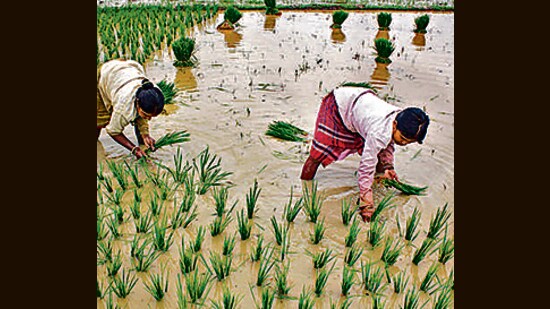Centre sets target for rice stocks in food security review meet
The meet was aimed at ensuring the Centre is able to buy sufficient rice stocks for the country’s public distribution system. Securing food supplies is critical this year as domestic cereal prices have risen and the world battles one of the gravest food crises in decades.

The Centre on Tuesday reviewed food security and procurement of summer-sown rice with 24 state governments amid an anticipated lower output of the staple due to a patchy monsoon, a person with knowledge of the matter said.
The meet was aimed at ensuring the Centre is able to buy sufficient rice stocks for the country’s public distribution system. Securing food supplies is critical this year as domestic cereal prices have risen and the world battles one of the gravest food crises in decades.
The Union food ministry had recently asked major rice-growing states to come up with projections of production, the person said. The Centre sought the estimates so that it could correctly determine how much of the staple will be available for procurement, which refers to the government’s purchase of grains from farmers for state-held reserves.
An official statement after the meeting said the Centre had set a target to purchase 51.8 million tonne of summer rice, higher than last year’s 50 million tonne.
In the review chaired by Union food secretary Sudhanshu Pandey, the Centre proposed states to “focus” on purchasing a higher quantity of millets to strengthen food security and also because of the International Year of Millets, the statement said.
The Centre was able to procure far less winter-sown wheat this year than it had hoped to, as farmers preferred to sell to private traders than to the government because rates had jumped above federally-determined floor prices on the back of a smaller crop.
The meeting was attended by food secretaries of key paddy-growing states, officials of the India Meteorological Department and the state-run Food Corporation of India, the Centre’s main-grain handling agency.
Pandey referred to increasing climate risks to food output in the meet. “Climate changes have been adversely affecting wheat and rice and resulting in reduction in their production,” the statement said.
According to the farm ministry’s estimates, the area under rice shrunk nearly 6% as rains skipped many rice-growing states. The deficit in the rice area has improved from 8% earlier.
The government held a massive 41 million tonnes of rice stocks as of August 1, way above the buffer requirement of 13.5 million tonnes by July 1. But wheat reserves have declined to their lowest levels in 14 years.
The Centre said states should stock 1.3 million tonne of millets, which are hardier crops resistant to extreme weather and can enhance food security substantially. States that attended the meet include Bihar, Uttar Pradesh, Punjab, Odisha, Jharkhand, Chhattisgarh and West Bengal. (EOM)



